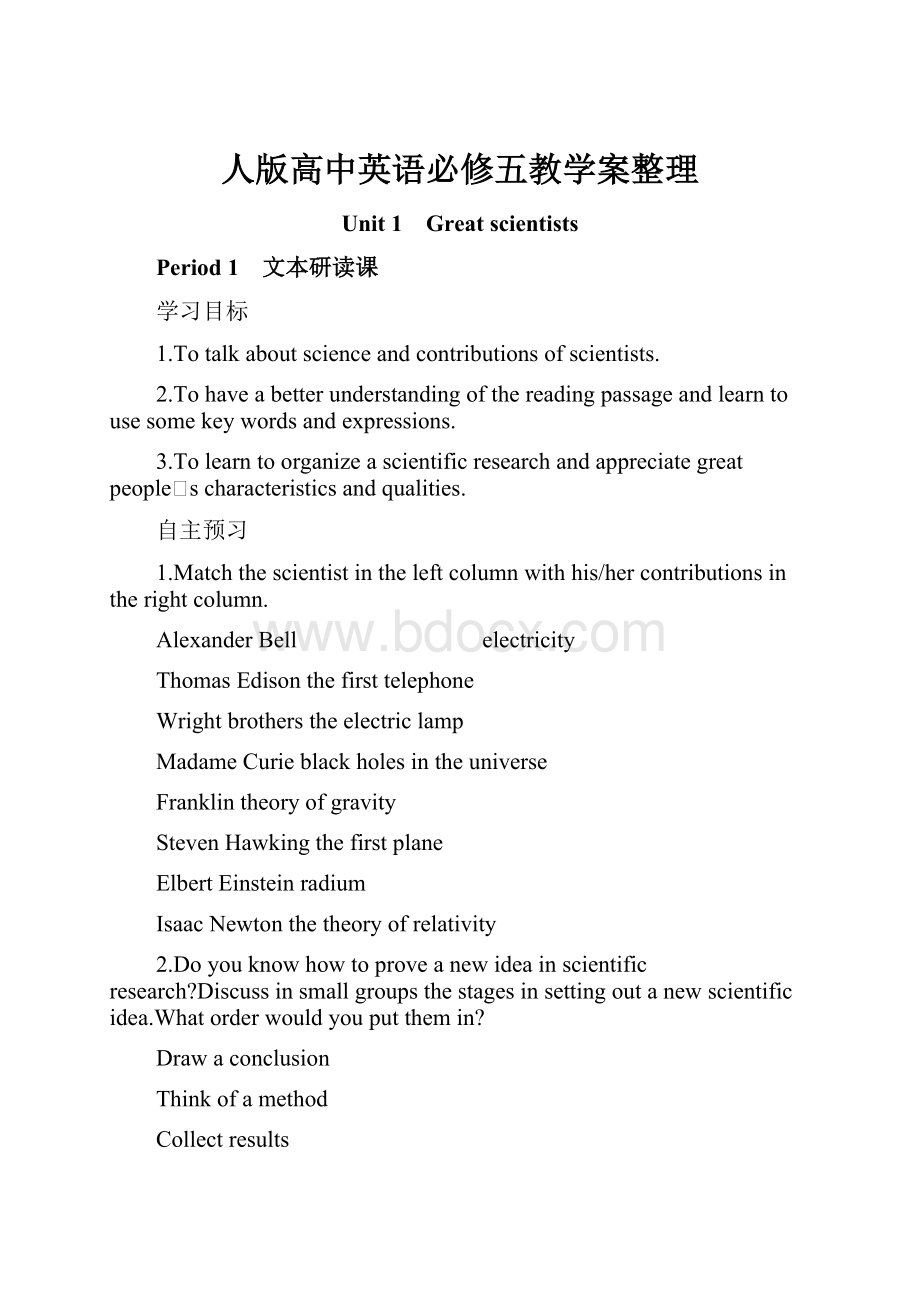人版高中英语必修五教学案整理.docx
《人版高中英语必修五教学案整理.docx》由会员分享,可在线阅读,更多相关《人版高中英语必修五教学案整理.docx(79页珍藏版)》请在冰豆网上搜索。

人版高中英语必修五教学案整理
Unit1 Greatscientists
Period1 文本研读课
学习目标
1.Totalkaboutscienceandcontributionsofscientists.
2.Tohaveabetterunderstandingofthereadingpassageandlearntousesomekeywordsandexpressions.
3.Tolearntoorganizeascientificresearchandappreciategreatpeoplescharacteristicsandqualities.
自主预习
1.Matchthescientistintheleftcolumnwithhis/hercontributionsintherightcolumn.
AlexanderBell electricity
ThomasEdisonthefirsttelephone
Wrightbrotherstheelectriclamp
MadameCurieblackholesintheuniverse
Franklintheoryofgravity
StevenHawkingthefirstplane
ElbertEinsteinradium
IsaacNewtonthetheoryofrelativity
2.Doyouknowhowtoproveanewideainscientificresearch?
Discussinsmallgroupsthestagesinsettingoutanewscientificidea.Whatorderwouldyouputthemin?
Drawaconclusion
Thinkofamethod
Collectresults
Makeaquestion
Findaproblem
Analysetheresults
Findsupportingevidence
3.Doyouknowthefeaturesofinfectiousdiseases?
学习过程
Step1:
Skimming
1.Whowasthegreatscientistinthepassageandwhatwasthedeadlydiseaseofitsday?
2.Whathappenedin1854?
3.Whatcanprovethatcholerawassevere?
Step2:
Carefulreading
1.ReadParagraph1andthenfillintheblanks.
JohnSnowwasan doctorinLondonwho QueenVictoriaasherpersonal .Hethoughtabouthelpingordinarypeople tocholera.Thoughthecauseandthe ofitwereunknown,hewantedtofacethe andsolvetheproblem.
2.ReadParagraphs2&3andthenanswerthequestions.
(1)Whatwerethetwotheoriesaboutthecauseofcholera?
(2)WhichtheorydidJohnSnowwanttoprove?
(3)Whatwashismethodofdoingtheresearch?
3.ReadParagraph4andanswerthequestions.
(1)Fillintheblankwithaproperword.
Firsthemarkedonamaptheexactplaces /( )allthedeadpeoplehadlived.
(2)Replacethesentencewithonethathasthesamemeaningfromthetext.
Itseemedthatthewatershouldbeblamed.
(3)ReadParagraph5andanswerthefollowingquestions.
①WhydidJohnSnowtellpeopletoremovethehandlefromthepump?
②Whathappenedafterthehandlewasremoved?
(4)ReadParagraph6&7andanswerthefollowingquestions.
①Wheredidthewomanliveandwhathadshedeliveredtoherhouseeveryday?
②Whatdidtheirdeathssuggest?
③WhatmeasuresdidJohnSnowtaketopreventthediseasefromspreading?
Step3:
Summary
1.Readthewholepassageagainandfinishtheexercise.
AScientificReportbyJohnSnow
Theproblem
Thecause
Idea1:
Idea2:
Themethod
Theresults
Idea1or2?
Why?
Theconclusion
2.Fillintheblanks.
JohnSnowwasawell-known inLondoninthe19thcentury.Hewantedtofindthe ofcholerainordertohelppeople tocholera.In1854whenacholera out,hebegantogatherinformation.He onamapwhereallthedeadpeoplehadlivedandfoundthatmanypeoplewhohaddrunkthedirtywaterfromthe died.Sohedecidedthatthepollutedwatercarriedcholera.Hesuggestedthatthe ofallthewatersuppliesbe andnewmethodsof withpollutedwaterbefound.Finally,“KingCholera”wasdefeated.
课后作业
1.Readthetextagain.
2.Trytoretellthetextwithonlyafewsentences.
Period2 知识讲练课
学习目标
1.Grasp6wordsand2phrasesinthisperiod;learntoexpressyourselvesbyusingthem.
2.Learnthemethodofconstructingknowledgetreesthroughself-studyandcooperativeexploration.
3.EnjoythefunofexpressingyourselfusingEnglishandparticipateinclasswithastrongpassion.
学习过程
一、词汇精粹
1.conclusionn.结论;结束
【教材原句】Drawaconclusion.得出结论。
【观察思考】
(1)Itisimportanttodrawaconclusionfromthefacts.从事实中得出结论很重要。
(2)Inconclusion,IdliketosayhowmuchIveenjoyedstayinghere.
最后我想说我在这里过得有多愉快。
【归纳总结】
make/draw/reach/cometo/arriveataconclusion
inconclusion
2.defeatvt.击败;打败;使(目的、希望等)落空
【教材原句】JohnSnowdefeats“KingCholera”约翰·斯诺战胜“霍乱王”
【观察思考】
(1)Ourteamdefeatedouropponentby5∶0.
我们队以5∶0的比分战胜了对手。
(2)Bynotworkinghardenoughyoudefeatyourownpurpose.
因你不太努力,所以达不到自己的目的。
【辨析】
defeat/beat/win
(1) , 都表示在战斗或竞赛中“战胜,打败(对手)”,后接竞争对手。
如:
beatthecompetitor/thecountry/theteam...打败对手/国家/团队……
(2) 也可表示“战胜,赢得”,但它的宾语通常是比赛、战争、奖品或表示尊重、崇拜之类意义的词。
如:
winarace/abattle/awar/ascholarship/aprize/amedal/friendship/reward...赢得比赛/战役/战争/奖学金/奖品/奖章/友谊/奖赏……
3.attendvt.照顾;护理;出席;参加
【教材原句】JohnSnowwasafamousdoctorinLondon—soexpert,indeed,thatheattendedQueenVictoriaasherpersonalphysician.约翰·斯诺是伦敦一位著名的医生——他的确医术精湛,因而成为维多利亚女王的私人大夫。
【观察思考】
(1)Wellattendtotheproblemlater.稍后我们将关注那个问题。
(2)Anurseattendstohisneeds.有个护士照顾他。
【归纳总结】
attendto专心于;照顾
【常用短语】
attendschool
attendalecture/meeting
attendawedding/ceremony
【练习】翻译句子
(1)他们在我们不在时管理事务。
(2)他在这个领域很出名,今晚会有成千上万的粉丝将参加他的讲座。
4.exposevt.使暴露,显露;曝光;揭露
【教材原句】Buthebecameinspiredwhenhethoughtabouthelpingordinarypeopleexposedtocholera.但是当他一想到要帮助那些受到霍乱威胁的普通百姓,他就感到很振奋。
【观察思考】
(1)Arealartistcanalwaysexposehisstudentstogoodartandmusic.
称职的艺术家总能使他的学生接触美好的艺术和音乐。
(2)Asajournalistinthewar,shewasexposedtomanydangers.
作为战地记者,她置身于多种危险中.
(3)Exposureofthebodytostrongsunlightcanbeharmful.
身体受日暴晒会造成损伤。
【归纳总结】
(在日光、风雨、危险中)暴露,暴晒(后接to+n.);(摄影的)曝光n.
beexposedto
【练习】用expose的适当形式填空
(1)Thesoilwaswashedawaybytheflood, barerock.
(2)Thebabywasleft thewindandrain.
(3)The oftheplotagainstthePresidentprobablysavedhislife.
5.absorb吸收;使(精神)贯注;占用(时间)
【教材原句】Thesecondsuggestedthatpeopleabsorbedthisdiseaseintotheirbodieswiththeirmeals.第二种看法是人们是在吃饭时把这种病引入体内的。
【观察思考】
(1)Theequipmentcanabsorbmoisturefromtheair.这一设备能从空气中吸收水分。
(2)Heisabsorbedinstudy.他专心读书。
(3)Thisjobabsorbsallofmytime.这件工作占用了我的全部时间。
【归纳总结】
beabsorbedin
6.blamevt.责备;谴责;归咎于 n.责怪;(过失、过错等)责任
【教材原句】Itseemedthatthewaterwastoblame.看来水是罪魁祸首。
【观察思考】
(1)Thecarelessdriveristoblameforthetrafficaccidentyesterday.
那个粗心的司机该为昨天发生的交通事故负责。
(2)Oneofthecomputersisbrokenandshesblamingitonme.
有台计算机出故障了,她把责任推到我身上。
(3)Thestudentblamedtheteacherforhisfailure.
学生因失败而怪老师。
【归纳总结】
blamesb.for(doing)sth.
blamesth.onsb.
sb.betoblamefor(doing)sth.
【注意】betoblame应负责(无被动形式)。
二、短语集锦
1.putforward提出(建议等);推荐;荐举;拨快(时钟指针)
【教材原句】Whoputforwardatheoryaboutblackholes?
谁提出了关于黑洞的理论?
【观察思考】
(1)Heputforwardanewplanyesterday.他昨天提出一个新计划。
(2)MayIputyournameforwardasapossiblechairmanofthecommittee?
我能否提名你当委员会主席?
【联想拓展】
puton
putup
putanendto
putoff
putone’sheartinto
putdown
putout
putback
2.apartfrom除……之外;另外
【教材原句】Apartfromtheconstructionmentionedabove,youhavealsolearnedthefollowingphrases.除了上面提到的结构,你们还学过以下的一些短语。
【观察思考】
(1)Apartfromafewfaults,heisaperfectteacher.除了几个缺点之外,他是一个很好的老师。
(2)Apartfromthecost,thedressdoesntsuitme.姑且不论价格,这件礼服也不适合我穿。
【联想拓展】
inadditionto
besides
except(for)
exceptthat
【练习】选择以上短语填空
(1)Asseniorstudents,westudyothersubjects English.
(2)Yourarticleiswellwritten somespellingmistakes.
三、重点句型
Somanythousandsofterrifiedpeoplediedeverytimetherewasanoutbreak.
每次瘟疫爆发,数以千计的人在恐惧中死去。
【典例背诵】
(1)EverytimeImeethim,Ialwaysthinkofthethingshappenedbetweenus.
每次见到他,我就想起发生在我们之间的事情。
(2)Immediatelyhesawthemessage,heknewhemisunderstoodhisbestfriend.
一见到纸条,他就知道他误会了他最好的朋友。
【归纳总结】
可作连词使用,引导时间状语从句,意为“每次,每当”;immediately,themoment,directly,instantly等都可以作 引导时间状语从句,意为“一……就……”。
四、成果展示
1. (既不)itscause (也不)itscurewasunderstood.
2.Sheis someproposalsforelectoralreform.
她正为选举制度改革提出一些建议。
3.用beat,defeat与win填空。
(1)Themotionwas by19votes.
(2)He thefirstprizeinthewritingcontest.
(3)Whois thedrum?
4.Heisagoodman (介词)hisbadtemper.
5.你能不能立刻处理这件事?
翻译:
6.Insummer,exposedtothesuncanbeveryharmfultoyourskin.(单句改错)
7.WeallfeelitisJackaswellashiswifethat fortheirsonsbadperformanceatschool.
A.aretoblameB.istobeblamed
C.aretobeblamedD.istoblame
课后作业
1.Masterwhatwehavelearnedtoday.
2.Makesentencesbyusingeachwordorphrase.
Period3 语言运用课
学习目标
1.Tocomprehendthepassageandimproveyourreadingcomprehensionandwritingabilities.
2.Tolearntoexpressyourideasfreelythroughself-directedstudyandcooperation.
3.TolearntodescribesomepersoninEnglish.
学习过程
Step1:
Pre-readingactivity(读前):
浏览文章内容的长度,把握阅读速度;结合插图,猜测文章话题。
Step2:
Reading
Task1:
Skimming—Skimthetextanddrawthetwotheoriesoftheuniverse.
BeforeCopernicustheory
ShowingCopernicustheory
Task2:
Carefulreading
1.Whycouldhenottellabouthistheory?
2.Howdidheexplainchangesinthemovementoftheplanetsandinthebrightnessofthestars?
3.Whatwashistheoryabout?
Task3:
Focusonlanguage
1.Onlyifyouputthesuntheredidthemovementsoftheotherplanetsintheskymakesense.
只有当你把太阳放在中心位置上,天空中其他行星的运动才能说得清楚。
画线部分的特点:
【练习】翻译句子
(1)只有用这种方法,你才能轻松地解决这个问题。
(2)就在你失去它的时候,你才会懂得时间的宝贵。
2.Heplacedafixedsunatthecentreofthesolarsystemwiththeplanetsgoingroundit.
他把太阳固定在太阳系的中心位置上,而行星则围绕着太阳转。
画线部分的特点:
【练习】翻译句子
(1)老师微笑地走进教室,身后还跟着一群小朋友。
(2)随着考试的结束,我们的假期开始了。
Step3:
Writing
学习建议:
请根据写作指导完成写作任务。
Thetopicis“StephenHawking”.Thewritingmustbewrittenabout120words.
斯蒂芬·霍金(StephenHawking),英国剑桥大学应用数学及理论物理学系教授,被称为在世的最伟大的科学家,还被称为“宇宙之王”。
请你根据下表所提供的信息,写一篇介绍霍金的英语短文。
1.1942年1月出生于英国牛津,被誉为当代最伟大的科学家之一,他在小时候就对科学表现出极大的兴趣,尤其擅长数学
2.1959年开始在牛津大学(UniversityofOxford)学习物理,1962年,前往剑桥大学(UniversityofCambridge)学习天文学,在那里,他开始对黑洞产生兴